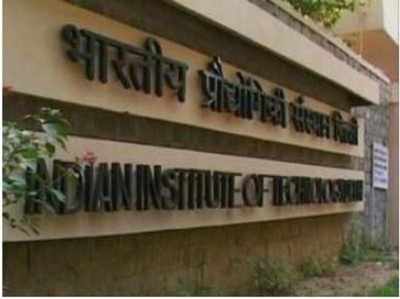- News
- India News
- IITs propose to take more students who pay full fees to increase revenue
Trending
This story is from September 30, 2019
IITs propose to take more students who pay full fees to increase revenue
As part of the model for financial autonomy, the IITs have proposed that tuition fees should cover their running expenses, including salaries & maintenance. The IITs also plan to increase intake of students who pay full fees to augment their revenue. Currently, students from reserved categories & from economically weaker sections pay a substantially lower fee.

Key Highlights
- Currently, students from reserved categories and those from economically weaker sections pay a substantially lower fee.
- At a meeting of the IIT council on Friday, the institutes, however, maintained that “financial autonomy does not mean withdrawal of government support to IITs”. The proposal has been referred to a committee by the HRD ministry.
NEW DELHI: As part of the model for financial autonomy, the Indian Institutes of Technology (IITs) have proposed that tuition fees should cover their running expenses, including salaries and maintenance. The IITs also plan to increase intake of students who pay full fees to augment their revenue.
Currently, students from reserved categories and those from economically weaker sections pay a substantially lower fee.
At a meeting of the IIT council on Friday, the institutes, however, maintained that “financial autonomy does not mean withdrawal of government support to IITs”. The proposal has been referred to a committee by the HRD ministry.
Calling for continued state support, the council suggested that the government directly provide scholarships using direct benefit transfer, or other mode of financial assistance, to students based on their socio-economic status so as the enable them to afford the tuition fees fixed by the institutions.
In order to meet the running expenditure, the IITs are looking at enrolling full fee-paying students as per their admission policy, which will be in addition to the number of students (with government aid) that the institutions propose to admit as part of an MoU with the government.
“The objective of financial autonomy is to remove bottlenecks and have more flexibility for revenue generation, other than from government grants. Also, this will make IITs less dependent on government funds for institutional activities as right now we are totally dependent on government budget,” said a director of an IIT who attended the council meeting.
The agenda paper on financial autonomy said that due to complete dependence on government funding, IITs were bound by processes which “scarcely permit innovation”. “But in order to compete at global level, these institutions should be encouraged to design their own programmes and take their own decisions, and that would require complete financial autonomy,” the paper added.
The proposal, however, envisages that no IIT should get “lesser annual financial support from government in the new model of financing as compared to the support they have been getting” so far.
Speaking to TOI, HRD minister Ramesh Pokhriyal said, “Autonomy is key for growth of institutions and research. But we also need to look at the proposals in totality before coming to a decision. So, a committee will now look into the proposals.”
Currently, students from reserved categories and those from economically weaker sections pay a substantially lower fee.
At a meeting of the IIT council on Friday, the institutes, however, maintained that “financial autonomy does not mean withdrawal of government support to IITs”. The proposal has been referred to a committee by the HRD ministry.
While salaries and maintenance expenses are to be met from tuition fees, it has been proposed that the cost for servicing infrastructure be met through loan from the Higher Education Financing Agency (HEFA).
Calling for continued state support, the council suggested that the government directly provide scholarships using direct benefit transfer, or other mode of financial assistance, to students based on their socio-economic status so as the enable them to afford the tuition fees fixed by the institutions.
In order to meet the running expenditure, the IITs are looking at enrolling full fee-paying students as per their admission policy, which will be in addition to the number of students (with government aid) that the institutions propose to admit as part of an MoU with the government.
“The objective of financial autonomy is to remove bottlenecks and have more flexibility for revenue generation, other than from government grants. Also, this will make IITs less dependent on government funds for institutional activities as right now we are totally dependent on government budget,” said a director of an IIT who attended the council meeting.
The agenda paper on financial autonomy said that due to complete dependence on government funding, IITs were bound by processes which “scarcely permit innovation”. “But in order to compete at global level, these institutions should be encouraged to design their own programmes and take their own decisions, and that would require complete financial autonomy,” the paper added.
The proposal, however, envisages that no IIT should get “lesser annual financial support from government in the new model of financing as compared to the support they have been getting” so far.
Speaking to TOI, HRD minister Ramesh Pokhriyal said, “Autonomy is key for growth of institutions and research. But we also need to look at the proposals in totality before coming to a decision. So, a committee will now look into the proposals.”
End of Article
FOLLOW US ON SOCIAL MEDIA










